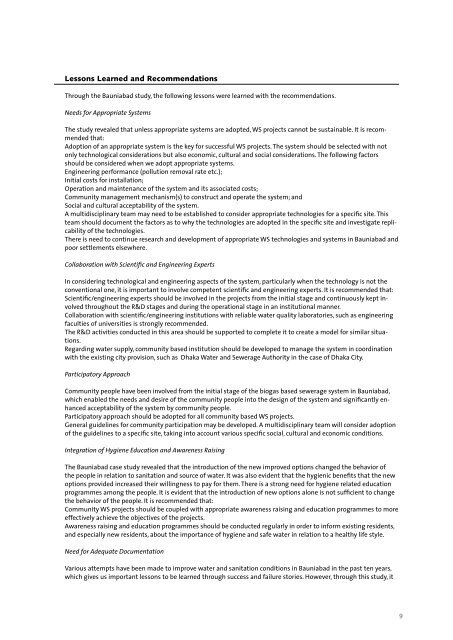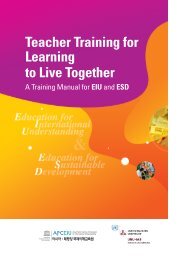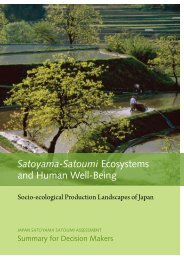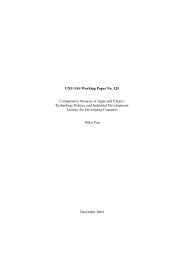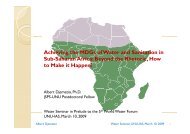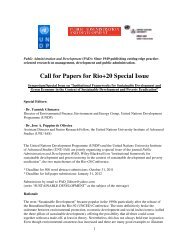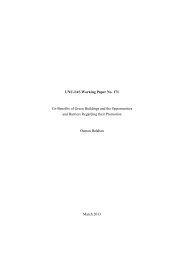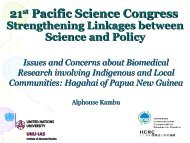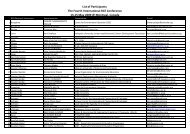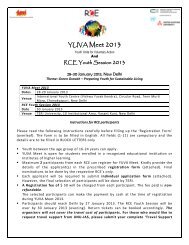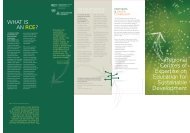Untitled - UNU-IAS - United Nations University
Untitled - UNU-IAS - United Nations University
Untitled - UNU-IAS - United Nations University
You also want an ePaper? Increase the reach of your titles
YUMPU automatically turns print PDFs into web optimized ePapers that Google loves.
Lessons Learned and Recommendations<br />
Through the Bauniabad study, the following lessons were learned with the recommendations.<br />
Needs for Appropriate Systems<br />
The study revealed that unless appropriate systems are adopted, WS projects cannot be sustainable. It is recommended<br />
that:<br />
Adoption of an appropriate system is the key for successful WS projects. The system should be selected with not<br />
only technological considerations but also economic, cultural and social considerations. The following factors<br />
should be considered when we adopt appropriate systems.<br />
Engineering performance (pollution removal rate etc.);<br />
Initial costs for installation;<br />
Operation and maintenance of the system and its associated costs;<br />
Community management mechanism(s) to construct and operate the system; and<br />
Social and cultural acceptability of the system.<br />
A multidisciplinary team may need to be established to consider appropriate technologies for a specific site. This<br />
team should document the factors as to why the technologies are adopted in the specific site and investigate replicability<br />
of the technologies.<br />
There is need to continue research and development of appropriate WS technologies and systems in Bauniabad and<br />
poor settlements elsewhere.<br />
Collaboration with Scientific and Engineering Experts<br />
In considering technological and engineering aspects of the system, particularly when the technology is not the<br />
conventional one, it is important to involve competent scientific and engineering experts. It is recommended that:<br />
Scientific/engineering experts should be involved in the projects from the initial stage and continuously kept involved<br />
throughout the R&D stages and during the operational stage in an institutional manner.<br />
Collaboration with scientific/engineering institutions with reliable water quality laboratories, such as engineering<br />
faculties of universities is strongly recommended.<br />
The R&D activities conducted in this area should be supported to complete it to create a model for similar situations.<br />
Regarding water supply, community based institution should be developed to manage the system in coordination<br />
with the existing city provision, such as Dhaka Water and Sewerage Authority in the case of Dhaka City.<br />
Participatory Approach<br />
Community people have been involved from the initial stage of the biogas based sewerage system in Bauniabad,<br />
which enabled the needs and desire of the community people into the design of the system and significantly enhanced<br />
acceptability of the system by community people.<br />
Participatory approach should be adopted for all community based WS projects.<br />
General guidelines for community participation may be developed. A multidisciplinary team will consider adoption<br />
of the guidelines to a specific site, taking into account various specific social, cultural and economic conditions.<br />
Integration of Hygiene Education and Awareness Raising<br />
The Bauniabad case study revealed that the introduction of the new improved options changed the behavior of<br />
the people in relation to sanitation and source of water. It was also evident that the hygienic benefits that the new<br />
options provided increased their willingness to pay for them. There is a strong need for hygiene related education<br />
programmes among the people. It is evident that the introduction of new options alone is not sufficient to change<br />
the behavior of the people. It is recommended that:<br />
Community WS projects should be coupled with appropriate awareness raising and education programmes to more<br />
effectively achieve the objectives of the projects.<br />
Awareness raising and education programmes should be conducted regularly in order to inform existing residents,<br />
and especially new residents, about the importance of hygiene and safe water in relation to a healthy life style.<br />
Need for Adequate Documentation<br />
Various attempts have been made to improve water and sanitation conditions in Bauniabad in the past ten years,<br />
which gives us important lessons to be learned through success and failure stories. However, through this study, it<br />
9


